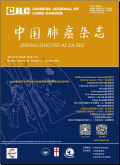中国肺癌杂志2024,Vol.27Issue(2):102-108,7.DOI:10.3779/j.issn.1009-3419.2023.102.48
保留迷走神经肺支对I期周围型肺腺癌患者术后咳嗽影响的初步研究
Effect of Preserving the Pulmonary Branch of Vagus Nerve on Postoperative Cough in Patients with Stage I Peripheral Lung Adenocarcinoma
摘要
Abstract
Background and objective Cough is one of the main complications after pulmonary surgery,which seriously affects the postoperative quality of life.Preserving the pulmonary branch of vagus nerve may reduce the incidence of postoperative cough.Therefore,the aim of this study was to investigate whether preserving the pulmonary branch of the vagus nerve could reduce the incidence of postoperative chronic cough in patients with stage I peripheral lung adenocarcinoma.Methods A total of 125 patients who underwent single-port thoracoscopic radical resection for lung cancer in the Depart-ment of Thoracic Surgery,The First Affiliated Hospital of University of Science and Technology of China from June 2022 to June 2023 were retrospectively selected,and divided into two groups according to whether the vagopulmonary branch was preserved during the operation,namely,the vagopulmonary branch group(n=61)and the traditional group(n=64).The general clinical data,perioperative conditions,lymph node dissection,Mandarin Chinese version of The Leicester Cough Questionnaire(LCQ-MC)scores before and 8 weeks after operation were recorded in the two groups.Both the two groups were divided into tamponade group and non-tamponade group according to whether autologous fat or gelatin sponge was tamponade after lymph node dissection.LCQ-MC scores and postoperative chronic cough of both groups were calculated.Results The LCQ-MC score of the traditional group was significantly lower than that of the vagopulmonary branch group in physiological,psychological,social and total scores at 8 weeks after surgery,and the difference was statistically significant(P<0.05).There were more cough patients in the traditional group than the vagopulmonary branch group at 8 weeks after surgery,with significant difference(P=0.006).Subgroup analysis was conducted separately for the vagopulmonary branch group and the traditional group.Among the patients in the vagopulmonary branch group and the traditional group,the LCQ-MC scores of the non-tamponade group 8 weeks after surgery were lower than those of the tamponade group(P<0.05).There were more patients with cough in the group 8 weeks after surgery than in the tamponade group(P=0.001,P=0.024).Conclusion For patients with stage I peripheral lung adenocarcinoma,the preservation of the pulmonary branch of vagus nerve is safe and effective,which can reduce the incidence of postoperative chronic cough and improve the postoperative quality of life of the patients.关键词
肺肿瘤/迷走神经/咳嗽/中文版莱斯特咳嗽量表Key words
Lung neoplasms/Nervi vagus/Cough/Mandarin Chinese version of The Leicester Cough Questionnaire引用本文复制引用
王高祥,陈郑玮,吴明胜,李田,孙效辉,徐美青,解明然..保留迷走神经肺支对I期周围型肺腺癌患者术后咳嗽影响的初步研究[J].中国肺癌杂志,2024,27(2):102-108,7.基金项目
本研究受国家自然科学基金项目(No.81973643)和安徽省自然科学基金项目(No.2308085MH296)资助 This study was supported by the grants from National Natural Science Foundation of China(No.81973643)and the Natural Science Foundation of Anhui Province(No.2308085MH296)(Both to Minran XIE). (No.81973643)

